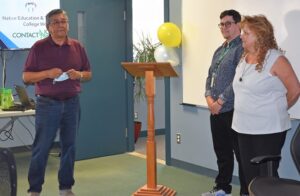Flexible learning opportunities and jobs in downtown North Bay

By Kelly Anne Smith
NORTH BAY— A new partnership between Contact North and Native Education Training College (NETC) has opened up loads of courses online with supports in downtown North Bay at 147 McIntyre West.
NETC provides Indigenous and non-Indigenous students with inclusive, accessible online courses in continuing education, professional development, basic skills, and career and technical training. NETC will be hosting Contact North’s new downtown location.
Education and Training Advisor with Contact North, Kristan Hanlon, says the co-venture gives Contact North an opportunity to support the NETC students and work with them.
“Now we have a location for them to come into downtown. We do have an online learning centre in North Bay located on the Canadore (College) campus. This one will be more centralized for people who are downtown. It’s more accessible for the employment centres.”
Hanlon says Contact North works with smaller, rural communities.
“We gear our services toward those smaller communities, Indigenous communities and Francophone communities to offer them the services that they may not normally have access to. We have a large focus on Indigenous communities and partnering and being in a location like NETC,” Hanlon says. “We help students from start to finish. We give them all the options available. We help get them registered. They can use the centre’s computers. We literally are there to support them from day one until they graduate.”
Ryan Sloan is an education and training representative with Contact North. He says jobs are available at the more than 15 cannabis stores in the North Bay area but to be a Budtender, potential employees must have CannSell Standard Certification, the only training program approved for legally authorized cannabis retailers in Ontario.
“It’s a simple course to do. It’s only four hours. Rather than individuals being turned away and being discouraged from getting that job; they’re able to get the job, and be connected with Contact North to get the certification. They can start the same week.”
Cultural Industries Ontario North (CION)’s Peter Mihaichuk made a presentation to attract potential film crew members. He’s a production designer and a Workplace Strategy and Development Officer for the film industry.
“We are looking for just about every position in film right now, especially in the North Bay area. It’s extremely, extremely busy. There are a lot of skills here that the students are learning that are transferable to film. We are in the midst of developing, say with the carpentry course, a small credential that adds on where they learn specifically for film.”
During his presentation, Mihaichuk outlined entry level positions: production office assistant, set production assistant, accounting trainees, location scouts, location production assistants, and more.
“North Bay has five films overlapping right now and we only have two and half crews. So, they are having to bring in, right now, a crew from Toronto or even as far as Vancouver,” he explains. “If you have a driver’s licence with a clean record, I could have you working tomorrow. Well, actually today.”
NETC’s LMS (learning management systems) Coordinator Alex Cook is also a great baker, whipping up what looked like a hundred delicious cupcakes for the grand opening. Alex’s job is to help students with programs available through NETC.
“Partnering with Contact North allows students to come in-person. Instead of it being just online, they have another option because a lot of students like human contact with face-to-face interaction. This gives the students an opportunity to work on their education and have assistance with that support system.”
For the grand opening, George Hughie of Kashechewan First Nation gave the new partnership a blessing in his way of speaking, the Cree language.
“I’m a Residential School Survivor. I went to high school here in my younger days. I went to college in Belleville. I went to Bible school and did training in Native studies. With the Bible school and native ways, I understand both sides. Most of my job’s experiences involved being a mediator between the church and Residential School Survivors. I still make presentations at the colleges and work with probation officers for cross-cultural training for them to understand what [Indigenous] people are going through. I also translate. I’m a Cree interpreter, so, I do a lot of that at hospitals,” he shares. “I was here about eighteen years ago. When I first came to North Bay, I came to school here at the Native Education and Training College. I was here for two years. I was working already. I was involved in politics. I know my land. I know my language. So, I had a good background but I wanted to upgrade my skills. I was connected to the Friendship Centre after. From there, I worked for fifteen years. I just retired March 31st. It’s good to take online training to upgrade your skills.”
Richard Gilson attended the grand opening to explore opportunities in higher education. He is with the YES Employment Services program, Pathways to Success. Just starting a full-time job, Gilson is interested in the online portion of courses.
“I’m looking to see how that would work in terms of how long it would take to do the online path versus in person. And if there’s any difference in terms of cost.”
Gail Cook who is the Recruitment and Student Support Coordinator at NETC says it is an Indigenous-owned private career college.
“There are weekly enrolments. Everyone is welcome.”

